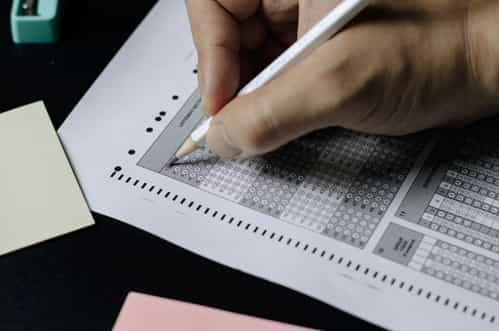Many students usually dread exam time while in school, which is usually because of the pressure to get good grades. This is because the goal of every student is to start and end a semester in flying colours. While there’s no one single strategy to ace an exam, and different things work for different people, there are tips that one can follow for successful exam preparation. Some of these tips include.
Take notes
Taking notes will assist you during the revision and test process. Using abbreviations is the most effective approach to speed up your note-taking. After a lesson, you should write down your abridged notes completely.
There is a clear association between writing and remembering. According to a Princeton University study, writing requires a thought process, which results in increased knowledge retention. In contrast, typing on a keyboard may be done verbatim without processing and reframing information, resulting in a lower percentage of retention. To check the credibility of notes or materials given to you, you can use a plagiarism checker. They will also help with essays and enable you to submit assignments free of plagiarism.
Attend Classes
If you want to pass your exams, not only will attending classes give you an edge, it will help you when you come to study your course materials. Some education instructors have attendance standards, so merely attending might directly influence your mark.
Attending classes will also help you assimilate better. Even if the lecturer strictly follows the textbook, being in the classroom and listening to the lectures/discussions will help you absorb the subject.
One of the advantages of attending college should be the opportunity to build mentorship relationships with some of your instructors, which will not occur if you do not attend the lectures. In addition, professors frequently have participation points (or extra points), so make an effort to participate in class discussions in addition to simply attending.
Avoid crash programs when it comes to studying.
Many students make the mistake of leaving their studying till the very end of the semester, which puts them in trouble. This is why it is important to make a study plan that works for you and don’t leave things to the final minute. While some scholars appear to do well on last-minute studying, this method of half studying is not always the greatest technique for exam prep. Put down how many examinations you have, the number of pages you need to cram or put to memory, as well as the number of days you have left. When this is done, organise your study habits properly.
Join Study groups
Some students are prone to procrastinating on their studies, assignments, papers, and projects. A study group can aid in the consolidation and clarification of coursework information, resulting in more productive classroom experiences and, ultimately, a higher GPA. Students may feel more eager to do well in class, examinations, and assignments if they comprehend the material and are motivated.
Furthermore, certain college students may be better at communicating the information to their peers for specific subjects. A study group is, in some ways, a developed tutoring session. Those familiar with the content may use it to review and deepen their academic comprehension, while those who are struggling can receive a new perspective to suit their learning style better.
Make Use of the Resources Available to You
It’s always possible that you may feel stuck or confused while preparing for exams. If you have difficulty in a course, contact your professor and ask for assistance. Your lecturer can also advise you on the materials you should concentrate on during your study time.
Most importantly, your campus provides a wealth of services to assist you in succeeding throughout finals week. You can find student tutors or a classmate study group, or you can use the abundance of the internet to research to further explain difficult concepts to you that your book can’t. These can help you gain clarity and set you up for good grades.
Take Breaks
Regular and long breaks while studying keep you revitalised and feeling refreshed. Many people believe that studying for as long hours is preferable, but this might be detrimental to you. Studies have shown that taking long and regular breaks aids with long-term information retention.
People are unique. This means choosing a study schedule that works for you. If you study best in the early hours of the day, start early before taking a lunch break. Alternatively, if you’re more active at night, take a longer time for recess earlier in the day, so you’re ready to relax in the evening.
Try not to feel bad about being outside in the sunshine instead of bending over your textbooks. Remember that Vitamin D is necessary for brain health.
Minimise Interruptions and Distractions
One thing that can steal your reading time is distractions. This is why you should find a peaceful location to study. It might be a specific area at home or a library. Asides from that, you should turn off your phone during study periods. Every time you receive a notification, checking your phone will distract and steal your attention away from your studies and interfere with your focus. You can either switch off completely or use the Do Not Disturb feature. This will be a silent notification when they come in.
Snack on healthy food
Studying for hours will leave you feeling like you deserve a treat. Given the situation, you may feel that you don’t have time to prepare a meal. However, what you eat significantly influences your energy levels and attention, so avoid junk food. Choose healthy meals that have been shown to improve focus and memory, such as fish, almonds, seeds, yogurt, and blueberries, to keep your body and brain well-fueled. The same is true on exam day: have a good lunch before the test, focusing on foods that give a steady release of energy throughout. Sugar may appear appetising, but it may cause your energy levels to plummet an hour later.
Get set before the exam day.
Make sure you have everything prepared well ahead of the exam; don’t wait until the last minute to discover you don’t know how to get there or what to bring. Check all laws and regulations, and plan your route and travel time accordingly. Make a trial run of the journey if feasible. If not, make a note of it.
Calculate the time it will take to get there, and then add additional time. You don’t want to be late because you had to run midway or be exhausted from getting lost. You might also arrange to commute to the exam with schoolmates if you know they’ll be on time.
Conclusion
If good grades are what you aim for, then following the above tips may will help you. Students miss out when preparing for exams because they don’t give themselves enough time to familiarise themselves with the subject. Knowing a subject in and out means you cannot be caught off guard during the exams. If done at the right time, everything above will lead you to success.
Examdays Article Agenda

